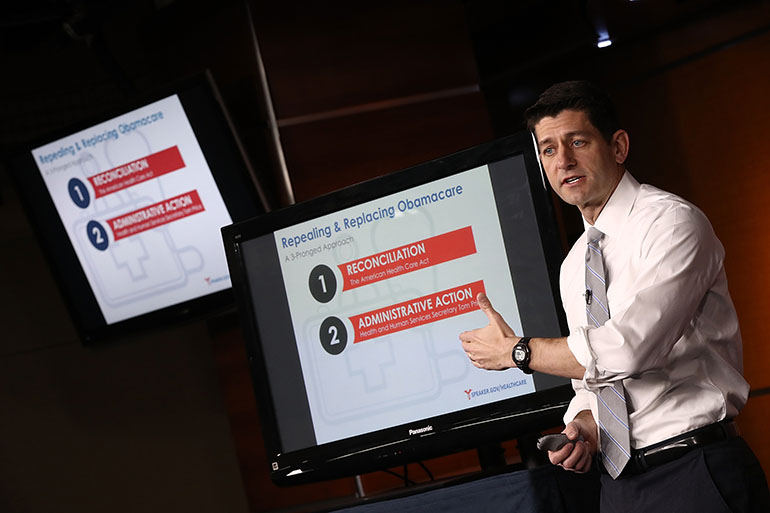The Republican overhaul of the federal health law passed by the House this month would result in slightly lower premiums and slightly fewer uninsured Americans than an earlier proposal. But it would leave as many as one-sixth of Americans living in states where older and sicker people might have to pay much more for their health care or be unable to purchase insurance at all, the Congressional Budget Office said Wednesday.
In some states, said the report, “less healthy people would face extremely high premiums, despite the additional funding that would be available” in the bill to help offset those increases.
The report incorporates the changes to the bill made just before it narrowly passed the House on May 4. Those changes included an amendment offered by Rep. Tom MacArthur (R-N.J.) that would let states waive some key provisions of the health law, including requirements to cover “essential health benefits” and to offer insurance to people with preexisting conditions at no extra cost.
CBO said the current version would result in savings of $119 billion over 10 years and 23 million more uninsured people than would be expected under the current law.
According to the estimate, premiums would be slightly lower than under the Affordable Care Act, but mostly because “the insurance, on average, would pay for a smaller proportion of health care costs.”
Prior to the changes, the CBO estimated that the bill would result in savings of $150 billion over the next decade and grow the number of uninsured Americans by 24 million. That dollar figure was a considerable change from the original version of the bill that CBO said would have saved $337 billion, but lawmakers decided to spend back some of those savings on help for those likely to be cut off from insurance.
The two earliest versions of the bill could not muster enough support for the House leadership to bring them to a vote on the floor. Later, MacArthur and leaders of the conservative Freedom Caucus negotiated changes that they said should help bring down premium costs for consumers. That is the bill approved and now evaluated by CBO.
The CBO also estimated that in states deciding to take the option to waive requirements related to charging sicker people more, “the nongroup market would start to become unstable.” In particular, said the report, “people who are less healthy (including those with preexisting or newly acquired medical conditions) would ultimately be unable to purchase comprehensive nongroup health insurance at premiums comparable to those under current law, if they could purchase it at all.”
And in states that chose to waive the requirements for essential benefits, even people with insurance “would experience substantial increases in what they would spend on health care,” because their policies might no longer cover expensive treatments like those for maternity care or mental health and substance abuse.
Despite repeated claims from President Donald Trump and congressional Republicans that the Affordable Care Act is collapsing, the CBO specifically said that the market would continue “to be stable in most areas” under current law. It predicted the same for the original version of the House bill.
In fact, the only place the CBO specifically said the individual insurance market might become unstable is in states that decide to waive the ACA’s coverage requirements. It did not guess which states might do that, but the report says that one-sixth of the population could be subject to that instability.
“What is clear is that these waivers make life much, much worse for people with preexisting conditions, for older people, for sicker people,” said Aviva Aron-Dine, a senior fellow at the Center on Budget and Policy Priorities and former Obama administration health staffer.
The savings in the bill are mostly the result of capping federal funding to states for the Medicaid program for those with low incomes and scaling back the tax credits that help some people with low and modest incomes pay for private insurance. An estimated 14 million of the 23 million people who would no longer have insurance would otherwise have obtained it through Medicaid.
The bill would also repeal nearly all the taxes imposed in the ACA to pay for the new benefits, including taxes on wealthy individuals and much of the health industry.
Reaction to the new estimate fell mostly along predictable party lines.
“CBO continues to find that through our patient-focused bill, premiums will go down and that our reforms will help stabilize the market,” said a statement from House Energy and Commerce Committee Chairman Greg Walden (R-Ore.) and its health subcommittee chairman, Michael Burgess (R-Texas).
By contrast, Rep. Steny Hoyer (D-Md.) said the new estimate shows “TrumpCare will kick millions of Americans off their insurance coverage and force consumers to pay more for less.”
But the reaction was not completely partisan. Sen. Bill Cassidy (R-La.), a key swing vote in the Senate, said that “Congress’s focus must be to lower premiums with coverage which passes the Jimmy Kimmel test,” referring to the late-night host’s tearful monologue about the health problems of his newborn son. The House-passed bill, he said, “does not. I am working with Senate colleagues to do so.”







